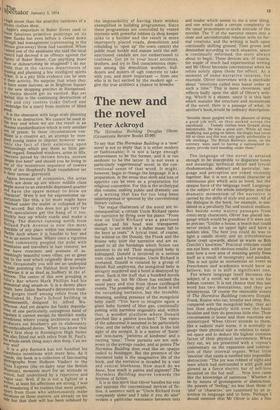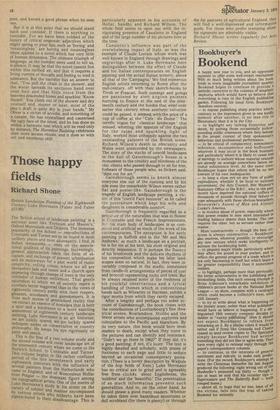The new and the novel
Peter Ackroyd
The Harmless Building Douglas Oliver (Grosseteste Review Books 0.00).
To say that The Harmless Building is a 'new' novel is not to imply that it is either modern or fashionable; it is not a large enough achievement to be the former, and it is too sardonic to be the latter. It is not even a particularly 'experimental' novel, in the conventional sense of that word. It might, however, begin to change the language. It is a preparation, in the sense that sloth and loss of appetite can be seen as a preparation for religious conversion. For this is the archetypal slim volume, making public and dramatic use of a writing that has for too long been misinterpreted or ignored by the conventional literary culture.
The major characters of the novel are inconsequential; a certain Uncle Richard opens the narrative by dying over his piano: "From now on Uncle Richard was a pearlised shadow and his head was transparent enough to see inside it a duller music fall to the keys as tears." A lyrical treat, of course, but wasted on the Donald, the Frank and the Rosine who litter the narrative and are exposed to all the hardships which fiction can summon to its aid. Their mongoloid baby is kidnapped, Donald is involved in a serious train crash and a hurricane, Uncle Richard is cremated, Donald is violated by a group of British Rail employees, the mongoloid baby is savagely murdered and a hotel is destroyed by arson. Such is the stuff that a hundred novels are made on, but Mr Oliver has excised the usual pace and size from these cardboard events. The presiding deity of the book is-not the onrushing narrative, but the invisible, dreaming, smiling presence of the mongoloid baby itself: "You have to imagine again a giant baby formed of blue gas, continually pulsing with harmless originality and, within that, a wooden platform where Donald perched like a passive love-bird." The vision of the subnormal is assumed to be particularly clear, and the subject of this book is the lost sight of the mongol. It is a matter of 'harm'
and 'non-harm,' patterns of kindness' and a varying 'time.' These pursuits are not unk nown to the average reader, and at points The Harmless Building does read like an opaque codicil to Heidegger. But the presence of the murdered baby is the imaginative life of the book, and the narrative is invaded by a vast and central blankness. How much do we know, how much is patina and pigment? The Harmless Building moves towards the horizon of fiction.
It is in this spirit that Oliver handles his text and satirises the conventional devices of fic
tion. A sentence such as "Uncle Richard lived completely alone and I take it you do also" evokes a particular resonance between text
and reader which seems to me a new thing, and one which adds a certain complexity to the usual proscenium-or-stalls attitude of the novelist. The 'I' of the narrator enters into a close and uncomfortable relation with its formal creations, and the writing is built upon continually shifting ground. Time grows and diminishes according to each situation, space
is continually reformed, the story always about to begin. These devices are, of course, the staple of much bad experimental writing and Mr Oliver becomes conventional when he relies solely upon them for effect. At a moment of some narrative interest, for example, Oliver intervenes with a platitude about "emotions called into banal order at such a time." This is mere cleverness, and , reflects badly upon the skill of Oliver's writ ing. Which is a shame, since it is this last which sustains the structure and momentum of the novel. Here is a passage of what, in another's book,would be ordinary description:
"Sensible shoes gurgled with the pleasure of doing a good job well, as they sucked across the marshland ... Tweedy 'clothes bore Donald along indomitably. He was a good sort. While all that muddying was going on below, his thighs had never felt so clean and this was only partly attributable to silk stockings. The British Railways shoes, on the contrary, were used to having a nationalised industry provide hard standing under them."
The language of the novel is aerated enough to be susceptible to disparate tones and meanings; technical detail and lyrical rhodomontade, abstract and particular, language and perception are yoked violently together. But it is not a central character or continuous plot which acts as bond, but the opaque force of the language itself. Language is the subject of the whole enterprise, and the dramatic momentum of the narrative is carried by the shifts of style and accent. All of the dialogue in the book, for example, is sustained in a peculiarly flat and neutral medium. But beside some watery passages from comic-strip characters, Oliver has placed language which would be grandiose if it were not so precise: "Unlike a house, a beach-hut could never switch on an upper light and have a sudden idea. The best you could do was to light a candle slowly and an icthyoloatrous flame crept upwards, about as warm as Bob Cratchit's knuckles." Practical criticism could run riot here, with obvious results. Let me just note how a new area of meaning gently frees itself as a result of incongruity and paradox. This is not quite as momentous an event as Frenchmen and academics would have us believe, but it is still a significant one.
For where language itself becomes the subject of a novel, we will look in vain for htfman content. It is not chance that this last word has two denotations, and they are synonymous. Of course the ostensible events of The Harmless Building concern Donald, Frank, Rosine who eat, breathe and sleep. But, compared with the mongoloid baby, they act less than adequately with even the basic faculties and they do precious little else. Their conversation is inane and their reactions are stereotyped. When Oliver attends to them, like a sadistic male nurse, it is normally to gauge their physical size in relation to external space and to deduce the highest common factor of their physical movements. When they eat, we are presented with a voyeur's commentary on the expansion and contraction of their internal organs. What little 'emotion' that exists is rarefied into impossible abstraction: "The joy was robbed of sighs and tears which had surrounded it with guilt and glowed as a fierce electric bar of self-love mounted on the hut wall ... Now love came like the knowledge of sameness." Whether it be by means of grotesquerie or abstraction, the powers of 'feeling,' no less than those of 'plot' or 'character,' are cauterised by an attention to language and to form. Perhaps I should mention that Mr Oliver is also a fine poet, and knows a good phrase when he sees one.
But it is at this point that we should stand back and consider. If there is anything to consider. For we have been robbed of the luxury of critical response: adjectives which might spring to your lips, such as 'boring' and 'meaningless,' are boring and meaningless when applied to a novel which has very little of human dimension. The ultimate triumph of language, as the trendier seers used to tell us, is silence. It may be that the novel cannot live within this rarified air, and that it requires a living current of thought and feeling to lend it substance. But the narrator has an answer to that: "You pull the chain in the shower, and the water spreads its unctuous hand over your hair and that little voice from the heavens descended hisses and sparkles: 'Know thyself.' You climb out of the shower and dry yourself and, sooner or later, most of the play's draft is quite dry in your hands." Mr Oliver is a victim of accidia, and something of a casuist. He has crystallised and cauterised the ugly face of the novel, and he has done so within a hermetic text which will be read only by initiates. The Harmless Building celebrates their more arcane rituals, and it does so with wit and enormous skill.



























 Previous page
Previous page